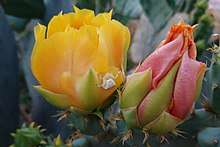Thomisus
Thomisus is a genus of crab spiders (family Thomisidae) with around 150 species described. The genus includes species that vary widely in their ecology, with some that ambush predators that feed on insects visiting flowers. Like several other genera in the family Thomisidae, they are sometimes referred to as flower crab spiders, from their crab-like motion and their way of holding their front legs, reminiscent of a crab spreading its claws as a threat.
| Thomisus | |
|---|---|
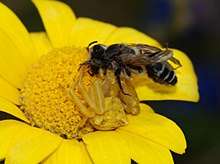 | |
| Thomisus onustus capturing a bee | |
| Scientific classification | |
| Kingdom: | Animalia |
| Phylum: | Arthropoda |
| Subphylum: | Chelicerata |
| Class: | Arachnida |
| Order: | Araneae |
| Infraorder: | Araneomorphae |
| Family: | Thomisidae |
| Genus: | Thomisus Walckenaer, 1805 |
| Type species | |
| Thomisus onustus Walckenaer, 1805 | |
| Species | |
|
See text | |
| Diversity | |
| 145 species | |
Description and behavior
As with most Thomisidae species, Thomisus exhibit sexual size dimorphism: females are 4 to 10 mm (0.16 to 0.39 in) in length, whereas males are only 2 to 7 mm (0.079 to 0.276 in). Many species are brightly colored, usually matching the color of the flower in which they are waiting in ambush.[1] Not all species are flower-dwelling, but among those that are, at least some species can change their colour over a period of some days to match the flower colour.[2] Studies suggest that bees are inclined to avoid a flower that contains a spider-sized object of a non-matching colour; whether this is specifically a mechanism for avoiding crab spiders, or simply that they are not attracted to flowers whose nectar guides are obscured however, is a more difficult question.[3] The colour changes that such species can achieve are typically in ranges of white, pink, and yellow.
For example, in Thomisus spectabilis, the method of camouflage is similar to the Misumena vatia, though T. spectabilis are visible to their prey, but not their predators. This species of crab spiders is UV reflective while the flower is UV absorbing creating a contrast between the spider and flower through the eyes of the pollinator.[4] The contrast created greatly attracts pollinators such as honeybees. This evolutionary method of camouflage increased the likelihood the crab spiders encountered prey, which in turn effects the fitness of the crab spiders. Due to the increased encounter rate of prey the spiders are able to focus energy on reproduction therefore leading to increased fitness in the spiders. The evolutionary method of camouflage greatly increases the survivability and fitness of crab spiders.
Distribution
The distribution of Thomisus species is almost worldwide, with the notable exception of most of South America.[5] Although Thomisus species can be found almost anywhere on earth, most species occur in the tropics and the warmer regions of the Old World, with fewer species in the region from New Guinea to Australia and the New World. Only Thomisus guadahyrensis is known from South America (in Peru).
Species
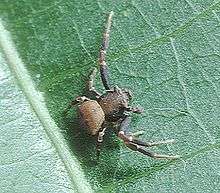
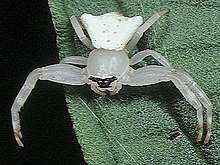
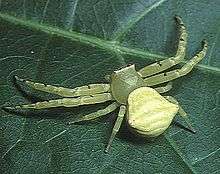
_on_Lavandula_5637.jpg)
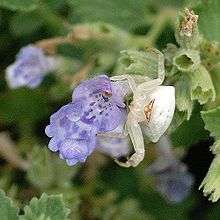
As of February 2017, the World Spider Catalog accepted the following species:[5]
- Thomisus albens O. Pickard-Cambridge, 1885 – Pakistan, Yarkand
- Thomisus albertianus Strand, 1913 – Gabon, Congo, Uganda, Angola
- Thomisus albohirtus Simon, 1884 – North, East Africa, Yemen
- Thomisus amadelphus Simon, 1909 – Vietnam
- Thomisus andamanensis Tikader, 1980 – India, Andaman Is.
- Thomisus angulatulus Roewer, 1951 – Gabon
- Thomisus angustifrons Lucas, 1858 – Gabon
- Thomisus arabicus Simon, 1882 – Yemen
- Thomisus armillatus (Thorell, 1891) – Nicobar Is.
- Thomisus ashishi Gajbe, 2005 – India
- Thomisus australis Comellini, 1957 – Central, Southern Africa
- Thomisus baghdeoi Gajbe, 2004 – India
- Thomisus bargi Gajbe, 2004 – India
- Thomisus beautifularis Basu, 1965 – India
- Thomisus benoiti Comellini, 1959 – Congo
- Thomisus bicolor Walckenaer, 1837 – USA
- Thomisus bidentatus Kulczyński, 1901 – West Africa to Saudi Arabia, Yemen
- Thomisus bigibbosus Keyserling, 1881 – USA
- Thomisus blandus Karsch, 1880 – Africa, Yemen
- Thomisus boesenbergi Lenz, 1891 – Madagascar
- Thomisus bonnieri Simon, 1902 – Oman
- Thomisus bueanus Strand, 1916 – Cameroon
- Thomisus bulani Tikader, 1960 – India
- Thomisus callidus (Thorell, 1890) – Sri Lanka, Singapore, Sumatra, Nias Is., Java
- Thomisus cancroides Eydoux & Souleyet, 1841 – Unknown
- Thomisus candidus Blackwall, 1866 – Tropical Africa
- Thomisus castaneiceps Simon, 1909 – Vietnam
- Thomisus cavaleriei Schenkel, 1963 – China
- Thomisus citrinellus Simon, 1875 – Mediterranean, Africa, Seychelles, Yemen, Socotra, Iraq
- Thomisus congoensis Comellini, 1957 – Central, Southern Africa
- Thomisus dalmasi Lessert, 1919 – Africa
- Thomisus danieli Gajbe, 2004 – India
- Thomisus daradioides Simon, 1890 – South Africa to India
- Thomisus dartevellei Comellini, 1957 – Congo, Ethiopia, Malawi
- Thomisus dentiger (Thorell, 1887) – Myanmar
- Thomisus destefanii Caporiacco, 1941 – Ethiopia
- Thomisus dhakuriensis Tikader, 1960 – India
- Thomisus dhananjayi Gajbe, 2005 – India
- Thomisus duriusculus (Thorell, 1877) – Sulawesi
- Thomisus dyali Kumari & Mittal, 1997 – India
- Thomisus elongatus Stoliczka, 1869 – India
- Thomisus eminulus Tang & Li, 2010 – China
- Thomisus galeatus Simon, 1909 – Vietnam
- Thomisus ghesquierei Lessert, 1943 – Congo
- Thomisus godavariae Reddy & Patel, 1992 – India
- Thomisus gouluensis Peng, Yin & Kim, 2000 – China
- Thomisus granulatus Karsch, 1880 – Southern Africa
- Thomisus granulifrons Simon, 1906 – India, Sri Lanka
- Thomisus guadahyrensis Keyserling, 1880 – Peru
- Thomisus guangxicus Song & Zhu, 1995 – China
- Thomisus hararinus Caporiacco, 1947 – Ethiopia
- Thomisus hui Song & Zhu, 1995 – China
- Thomisus hunanensis Peng, Yin & Kim, 2000 – China
- Thomisus ilocanus Barrion & Litsinger, 1995 – Philippines
- Thomisus iswadus Barrion & Litsinger, 1995 – Philippines
- Thomisus italongus Barrion & Litsinger, 1995 – Philippines
- Thomisus janinae Comellini, 1957 – Congo, Tanzania
- Thomisus jocquei Dippenaar-Schoeman, 1988 – Malawi
- Thomisus kalaharinus Lawrence, 1936 – Africa, Yemen
- Thomisus katrajghatus Tikader, 1963 – India
- Thomisus keralae Biswas & Roy, 2005 – India
- Thomisus kitamurai Nakatsudi, 1943 – Ryukyu Is.
- Thomisus kiwuensis Strand, 1913 – Central Africa
- Thomisus kokiwadai Gajbe, 2004 – India
- Thomisus krishnae Reddy & Patel, 1992 – India
- Thomisus labefactus Karsch, 1881 – China, Korea, Taiwan, Japan
- Thomisus laglaizei Simon, 1877 – Myanmar, Philippines, Java, Sumatra
- Thomisus lamperti Strand, 1907 – Madagascar
- Thomisus leucaspis Simon, 1906 – India, New Caledonia
- Thomisus litoris Strand, 1913 – Central Africa
- Thomisus lobosus Tikader, 1965 – India
- Thomisus ludhianaensis Kumari & Mittal, 1997 – India
- Thomisus machadoi Comellini, 1959 – Angola, Cape Verde Is., South Africa
- Thomisus madagascariensis Comellini, 1957 – Madagascar
- Thomisus magaspangus Barrion, Barrion-Dupo & Heong, 2013 – China
- Thomisus manishae Gajbe, 2005 – India
- Thomisus manjuae Gajbe, 2005 – India
- Thomisus marginifrons Schenkel, 1963 – China
- Thomisus meenae Gajbe, 2005 – India
- Thomisus melanostethus Simon, 1909 – Vietnam
- Thomisus mimae Sen & Basu, 1963 – India
- Thomisus modestus Blackwall, 1870 – Italy
- Thomisus natalensis Lawrence, 1942 – Southern Africa
- Thomisus nepenthiphilus Fage, 1930 – Sumatra
- Thomisus nirmali Saha & Raychaudhuri, 2007 – India
- Thomisus nossibeensis Strand, 1907 – Madagascar
- Thomisus obscuratus Caporiacco, 1947 – East Africa
- Thomisus obtusesetulosus Roewer, 1961 – Senegal
- Thomisus ochraceus Walckenaer, 1841 – Algeria
- Thomisus odiosus O. Pickard-Cambridge, 1898 – Mexico
- Thomisus okinawensis Strand, 1907 – Thailand to Ryukyu Is., Philippines, Indonesia
- Thomisus onustus Walckenaer, 1805 (type species) – Palearctic
- Thomisus oscitans Walckenaer, 1837 – USA
- Thomisus pateli Gajbe, 2004 – India
- Thomisus pathaki Gajbe, 2004 – India
- Thomisus penicillatus Simon, 1909 – Vietnam
- Thomisus perspicillatus (Thorell, 1890) – Borneo, Sulawesi
- Thomisus pooneus Tikader, 1965 – India
- Thomisus pritiae Gajbe, 2005 – India
- Thomisus projectus Tikader, 1960 – India
- Thomisus pugilis Stoliczka, 1869 – India
- Thomisus rajani Bhandari & Gajbe, 2001 – India
- Thomisus retirugus Simon, 1909 – Vietnam
- Thomisus rigoratus Simon, 1906 – India
- Thomisus rishus Tikader, 1970 – India
- Thomisus roeweri Comellini, 1957 – Tanzania
- Thomisus schoutedeni Comellini, 1957 – Congo
- Thomisus schultzei Simon, 1910 – Southern Africa
- Thomisus scrupeus (Simon, 1886) – Africa
- Thomisus shillongensis Sen, 1963 – India
- Thomisus shivajiensis Tikader, 1965 – India
- Thomisus sikkimensis Tikader, 1962 – India
- Thomisus simoni Gajbe, 2004 – India
- Thomisus socotrensis Dippenaar-Schoeman & van Harten, 2007 – Socotra
- Thomisus sorajaii Basu, 1963 – India
- Thomisus spectabilis Doleschall, 1859 – India to Australia
- Thomisus spiculosus Pocock, 1901 – West, Central, Southern Africa
- Thomisus stenningi Pocock, 1900 – Africa, Seychelles, Yemen
- Thomisus stigmatisatus Walckenaer, 1837 – USA
- Thomisus stoliczkai (Thorell, 1887) – Myanmar
- Thomisus sundari Gajbe & Gajbe, 2001 – India
- Thomisus swatowensis Strand, 1907 – China
- Thomisus telanganaensis Pravalikha & Srinivasulu, 2015 – India
- Thomisus tetricus Simon, 1890 – Yemen
- Thomisus transversus Fox, 1937 – China
- Thomisus tripunctatus Lucas, 1858 – West Africa
- Thomisus tuberculatus Dyal, 1935 – Pakistan
- Thomisus turgidus Walckenaer, 1837 – USA
- Thomisus unidentatus Dippenaar-Schoeman & van Harten, 2007 – Yemen, Iraq, Iran
- Thomisus venulatus Walckenaer, 1841 – Algeria
- Thomisus viveki Gajbe, 2004 – India
- Thomisus vulnerabilis Mello-Leitão, 1929 – Myanmar
- Thomisus wangi Tang, Yin & Peng, 2012 – China
- Thomisus whitakeri Gajbe, 2004 – India
- Thomisus yemensis Dippenaar-Schoeman & van Harten, 2007 – Yemen
- Thomisus zaheeri Parveen, Khan, Mushtaq, Ahmad & Rana, 2008 – Pakistan
- Thomisus zhui Tang & Song, 1988 – China
- Thomisus zuluanus Lawrence, 1942 – South Africa
- Thomisus zyuzini Marusik & Logunov, 1990 – Turkey, Saudi Arabia to Central Asia
References
- Murphy, Frances & Murphy, John (2000). An Introduction to the Spiders of South-East Asia. City: Malaysian Nature Society. ISBN 983-9681-17-6.
- Filmer, Martin (1997). Southern African Spiders. City: BHB International / Struik. ISBN 1-86825-188-8.
- Reuven Dukas and Douglass H. Morse ; Crab spiders affect flower visitation by bees ; OIKOS 101: 157–163, 2003
- Gawryszewski, F. M., A. L. Llandres, and M. E. Herberstein. "Relationship between colouration and body condition in a crab spider that lures pollinators." Journal of Experimental Biology 215, no. 7 (2012): 1128-1136.
- "Gen. Thomisus Walckenaer, 1805", World Spider Catalog, Natural History Museum Bern, retrieved 2017-02-25
| Wikimedia Commons has media related to Thomisus. |
